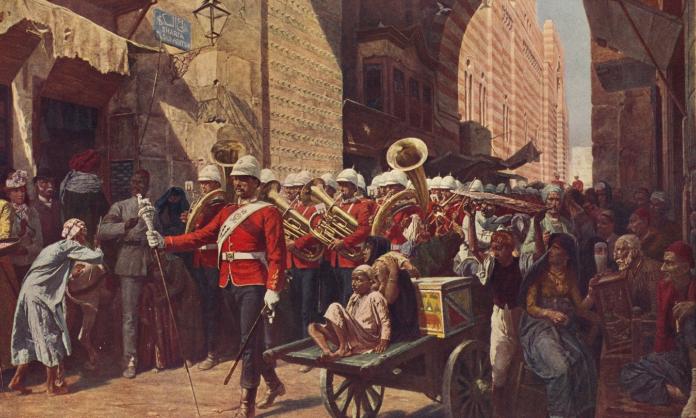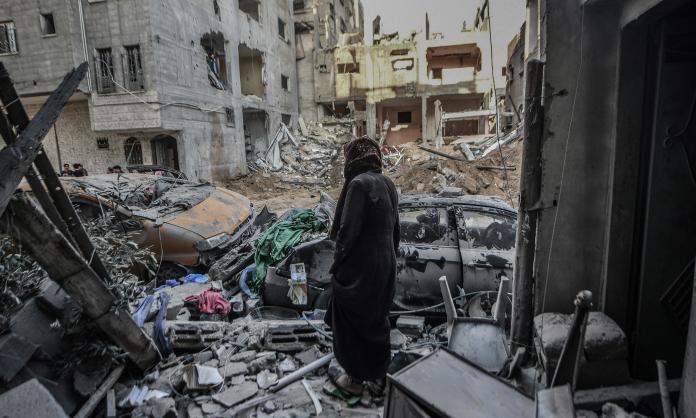From the early days of colonisation to this century’s “War on Terror”, Britain, France and the United States and its allies have terrorised the Middle East and North Africa.
Western countries talk a lot about their claimed global role promoting democracy over dictatorship, freedom over terror, enlightenment over barbarism. Yet they are responsible for monumental death and destruction. Think of the transatlantic slave trade, the genocides stemming from colonisation, the mass slaughter of two world wars, the atomic bombing of Hiroshima and Nagasaki, napalm in Vietnam, depleted uranium in Iraq—and so much more.
The Middle East has been a central target of Western imperialism because it is home to two things that matter a great deal to the people who run capitalism: oil and trade routes.
Oil has been capitalism’s most important resource since it emerged as a key energy source in the early twentieth century. It’s one of the dirtiest sources of energy, but because it is abundant and highly profitable, the global transport system has never been weaned off it.
The region’s first large oil deposit was found in Iran in 1908; the Anglo-Persian Oil company was established the following year to exploit it. The name suggests that it was a joint venture, but it was a British company and fittingly changed its name to British Petroleum in 1954. Its first major customer was the British Navy.
In the years that followed, oil was discovered across much of the region, which led to a ceaseless scramble for the commodity—and for the entire region, which is today estimated to contain about half of the world’s known reserves. Whoever controls these controls a pillar of the world economy.
The conflicts have not always been about direct consumption of the oil. The United States, for example, is a net exporter of oil, but control or at least significant influence over the Middle East gives that country’s capitalists leverage against their competitors, who rely on imported oil. That’s why so many wars have been waged for control of the Middle East.
Sometimes, people in power are quite open about this. UK Foreign Secretary Selwyn Lloyd put it bluntly in 1958, referring to Kuwait and Saudi Arabia: “At all costs these oil fields must be kept in Western hands. We need, when things go wrong, to ruthlessly intervene”. In 1990, as the United States was preparing to wage war on Iraq under the pretence of liberating neighbouring Kuwait, Lawrence Korb, a former assistant secretary of defence, said: “If Kuwait grew carrots, we wouldn’t give a damn”.
Then there are trade routes: some of the world’s most important run through the Middle East. Because capitalists are always trying to increase their profits, they have for centuries attempted to reduce costs by finding cheaper sources of raw materials, cheaper pools of labour, or just bigger markets for their products. So supply and production chains extend all around the world, and are particularly dependent on seaborne trade to move commodities between regions.
For instance, Egypt’s Suez Canal is the main route between Europe and Asia, and carries roughly 12 percent of global trade. The Strait of Hormuz is a pathway through which roughly one-third of the world’s oil passes. It connects the Persian Gulf and the Gulf of Oman, and is bordered by Iran, the United Arab Emirates and Musandam Governorate, an exclave of Oman.
At the September G20 meeting in New Delhi, India, US President Joe Biden announced a new trade route connecting India and Europe via the United Arab Emirates, Saudi Arabia, Jordan and Israel. Its purpose is to rival China’s Belt and Road Initiative, which was originally conceived in part to link East Asia and Europe via a “new Silk Road” of rail freight infrastructure through the former Soviet republics of Central Asia.
Controlling access to such routes, or at least making sure they are controlled by allies, is a requirement of any global power. That’s why the United States often talks about “freedom of navigation” (a euphemism meaning navigation according to the rules laid out by the US) in the South China Sea, and why there have been major conflicts over who controls Suez and the Persian Gulf.
The most obvious problem that the West has faced in trying to control the Middle East and North Africa stems from the fact that it is inhabited by other people. Millions of them, in fact, who hold the crazy idea that, because they live there, they should control the resources and should exercise full sovereignty in the way that, for example, the US government does in its own territory in North America.
The West has traditionally responded to such sentiments by using violence and coercion and labelling as “terrorism” any resistance to its rule.
In the early years, this was straight up colonisation. The British and French first went in during the scramble for world domination in the nineteenth century. France occupied Algeria in 1830, and Britain entered Aden (now in Yemen) nine years later. Tunisia, Egypt, Sudan, Libya and Morocco followed.
When the Ottoman Empire collapsed at the end of World War One, it was open slather for the victors of the war. If you’ve ever wondered why some borders in the Middle East are remarkably straight, bearing no relation to geographic features like mountain ranges and rivers, the answer lies in a clandestine London meeting at 10 Downing Street in late 1915.
In attendance was British Prime Minister Herbert Asquith, warmongers Lord Kitchener and Lloyd George, and diplomatic adviser Mark Sykes. They had gathered to discuss how to carve up the crumbling empire. Sykes slid his finger across a map and said: “I should like to draw a line from the ‘e’ in Acre to the last ‘k’ in Kirkuk”.
This became the basis of the agreement (known as Sykes-Picot) drawn up with French diplomat Francois Georges-Picot a few months later. They took out a map, a ruler and a pencil, and with a few small markings dictated the fate of millions of people. Britain took what is now Palestine, Jordan, Iraq and Egypt, while France claimed Syria and Lebanon. In 1920, this setup was mandated by the League of Nations, the precursor to the United Nations.
But British and French power was waning (soon to be replaced by the might of the United States), and direct colonial rule in the style of India and Algeria was not really an option for militaries weakened by the war. As well, the people of the region made it clear that they wanted self-determination, not to be under the mandate of a European power. In the following decade, movements for self-rule were crushed in Iraq, Egypt and Syria.
To retain control of the region’s resources, Western imperialists developed two strategies to establish and maintain their power.
The first was installing local dictators who would do the West’s bidding in return for a share of the bounty. The British backed the sons of the sharif of Mecca, Faisal and Abdullah, as the rulers of Iraq and Jordan respectively, and supported the shah of Iran. The Middle East is as divided by social class as anywhere else in the world: there is a mass of poor workers and farmers who struggle to eke out an existence, and a minority of billionaire kings and capitalists rich from the oil wealth.
By the 1950s, the United States had replaced Britain as the dominant global power, and it has since adopted the same strategy of finding friendly local rulers while intervening to force “regime change” if a state falls out of line. This is one of the great hypocrisies of Western imperialism: when a dictatorial state is an adversary, like Russia or China, its leaders are labelled brutal dictators who must be pulled into line, but when a similar state is friendly, like Saudi Arabia, there is no such rhetoric.
This largely explains the War on Terror—the invasions of Iraq and Afghanistan that slaughtered more than a million people. The excuse was the 9/11 terrorist attack in the US, but the intention was to reshape the region to make it more compliant with US capitalism’s interests.
Yet such grand designs have time and again been challenged by mass movements to oust the pliant regimes, such as when the 1979 Iranian revolution overthrew the US-backed monarchy, or by resistance that has thwarted US wars, like the armed resistance that emerged in Iraq after the US invaded.
So another complementary strategy was needed: Israel. Israel’s importance to Western imperialism has nothing to do with its domestic resources—Israel doesn’t really have any—but is due to the strategic role its founders pledged to play within the region.
The leaders of the European Zionist movement in the early twentieth century, which was at the time a right-wing fringe element of the large Jewish community, appealed to the British government to let them establish a Jewish-only state in Palestine. Their proposal was: if you let us do this, we will be your number one most faithful ally in the Middle East.
Britain backed the proposal in 1917, and the United Nations formally sanctioned the partitioning of Palestine in 1947. From day one, Israel began to prove its worth to the West. Five neighbouring Arab countries mobilised their armies in response to Israel’s declaration of independence in 1948, but were swiftly beaten. In 1956, Israel joined a British military assault on Egypt when the nationalist leader Gamal Abdel Nasser nationalised the Suez Canal.
And in 1967, Israel defeated the armies of Jordan, Lebanon and Syria in just six days, taking over more territory in the process. Following this victory, the US viewed Israel as its most vicious and loyal attack dog in the region. Between 1967 and 1972, US aid to the country jumped from $13 million to $600 million a year. Israel has remained the biggest recipient of US aid ever since. It has been armed to the teeth with US weapons and enjoys full support from the West for every brutal attack on Palestine.
The thing that ultimately made Israel different to the other regional regimes was that its people, not just its government, could be counted on. Israeli Jews are an oppressor nation consciously aligned with Western imperialism. They will not, unlike the workers of Iran or Egypt for example, rise in revolt against their own government and its ties to the United States. Jewish Israelis may break with this or that Israeli government, but the big majority are unlikely to break with Zionism. That’s what makes the country the most reliable partner of the West.
The West has destroyed the lives of millions of people across the region for its own cynical reasons: profit and power. It has no intention of changing course now—there is too much power and too many profits at stake.
According to the US Department of Defense, there are more than 30,000 US troops stationed across Syria, Turkey, Iraq, Kuwait, Jordan, Israel, Bahrain, Qatar, Saudi Arabia, the UAE and Oman. It has shown again and again that it will mobilise these forces—and many more—if ever there is a challenge to its rule.







